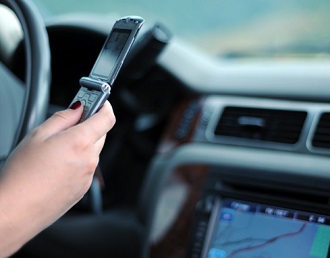Texting While Driving Offence: Penalty Points and Fines Set to Double
Texting While Driving Offence: Penalty Points and Fines Set to Double

Figures from the Department for Transport (DFT) show that drivers distracted by their phone were a factor in 440 accidents in Britain last year, with 22 of them being fatal. This has led to increasing pressure on the Government to do more to stop drivers using phones at the wheel.
Under proposed new rules, drivers caught using handheld mobile phones in Britain will get six points on their licence and face a £200 fine. The DFT said they expect the new rules to come into force in the first half of 2017.
The new penalties will involve an increase from the current three penalty points and a £100 fine, and will be accompanied by a government Think! campaign. Prime Minister, Theresa May, recently vowed:
“Just as we have made it socially unacceptable to drink and drive, so we need to do the same with using a mobile phone while driving”. Alongside this, the government plans to launch a consultation on dangerous driving by the end of the year. Theresa May added: “the sentence should fit the crime for those who kill or seriously injure on our roads”.
Young people have the highest risk of car crashes compared to adult drivers. Research done by the DFT (Reported road casualties 2015), found that although Young drivers make up 1.5% UK licence holders, 9% of fatal and serious crashes involve this age group. The combination of youth and inexperience puts this age group at high risk of having an accident.
Texting whilst driving is a major risk factor that distracts both young and adult drivers; more than 50% of 17-29 year olds currently text and drive. Research done by which.co.uk found that in a case where a person is texting and driving, they moved closer to the car in front by an average of 12 metres. This suggests that those who text, are more likely to tailgate, drift between lanes and even crash.
Young people have the highest risk of car crashes compared to adult drivers. Research done by the DFT (Reported road casualties 2015), found that although Young drivers make up 1.5% UK licence holders, 9% of fatal and serious crashes involve this age group. The combination of youth and inexperience puts this age group at high risk of having an accident.
The 45% of young drivers who admitted to texting and driving at least once a month in a survey done by Brake.org increase their chances of a car crash. A recent driver faces having their driving licence revoked if they get 6 points or more within 2 years of passing their test.

Not only are they risking their lives, one in eight young people (13%) are breaking the law by using hand-held devices at the wheel. The survey also found that in less than a decade, the use of hands-free devices has increased from 22% in 2006 to 32% in 2014. This suggests figures will continue to increase in the next few years unless drastic changes are made.
This research has prompted the government to act quickly. A new law proposed to come in to effect from January 2017 is expected to reduce the number of people killed and seriously injured on Britain’s roads. Candidates will use a sat-nav during a driving test; answer ‘show me, tell me’ questions while driving and independent driving assessment will be increased from 10 to 20 minutes.
Having a driving ban or any road traffic problems with the law can be stressful in many ways. At IBB Solicitors we have solicitors who specialise in road traffic law and advise individuals and employers facing charges relating to mobile phone use. Our goal is to help you understand the charges, advance any defence and support you if you go to court.
Contact our driving and mobile offence solicitors
It is advisable to seek legal advice if you are facing charges relating to mobile phone use, including texting and driving offences. You should remember that the purpose of the legislation is to ensure road safety. Using a mobile phone whilst driving decreases your awareness and response time and it is possible that you could also be charged with other, more serious offences such as careless driving or dangerous driving. Penalties for these offences, especially if an accident occurs, can be far higher.
Call us on 0330 999 4999 if you are charged with a mobile phone offence or email us on criminaldefence@ibblaw.co.uk.
